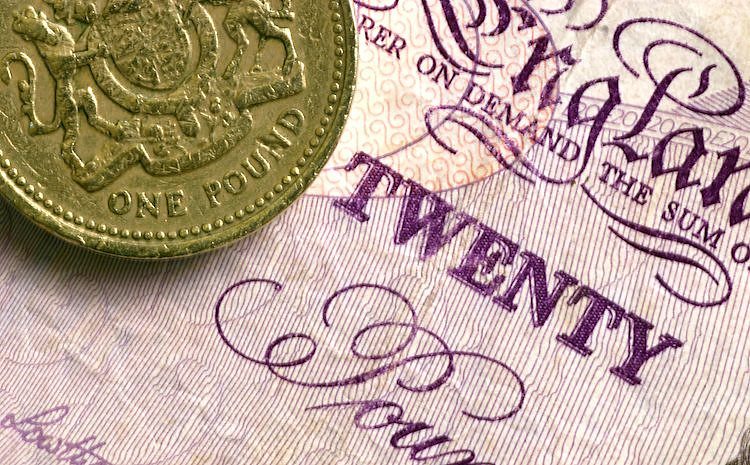Pound Sterling cracks as hawkish BoE bets deepen recession risks
- Pound Sterling faces an intense sell-off as the market mood dampens.
- The UK economy faces varied consequences of higher interest rates by the BoE.
- Britain’s GDP for July fell by 0.5% due to a decline in service industry output.

The Pound Sterling (GBP) prints a fresh four-month low as strong wage growth momentum in August has set a hawkish undertone for the Bank of England’s (BoE) September monetary policy decision. The GBP/USD pair dropped sharply despite investors hope that a hawkish interest rate decision from the BoE will scrap its policy divergence with the Federal Reserve (Fed).
The UK economy is facing varied troubles due to the BoE’s restrictive interest rate policy stance such as severely strong wage growth, and a labor market in which demand has started easing. The British economic outlook has turned vulnerable as the overall output is shrinking due to a deteriorating demand environment. The likelihood of reporting a technical recession by the UK economy is higher as more interest rate hikes from the BoE are already in the pipeline.
Daily Digest Market Movers: Pound Sterling extends downside on strong US Dollar
- Pound Sterling trades without direction around 1.2500 as investors shift their focus to the UK inflation data for August, which will provide meaningful cues about the September rate decision.
- Investors see August consumer inflation data as extremely stubborn as wage growth momentum in July remains stronger than anticipated despite a slowdown in labor demand.
- Sarah Breeden, who will replace BoE Deputy Governor Jon Cunliffe in November, warned that risks to inflation are skewed to the upside. She forecasts the achievement of price stability in two years.
- Average Earnings Excluding Bonuses in the three months to July landed at 7.8%, in line with estimates and the former release. Wage growth data including bonuses rose to 8.5% against projections and the former release of 8.2%.
- Higher wage growth and soft labor demand indicate that UK firms are spending more on retaining employees, which could keep consumer spending robust.
- The BoE is widely expected to raise interest rates in September as the battle against persistent inflation is far from over. This would be the 15th straight interest rate increase. Investors anticipate an interest rate hike of 25 basis points (bps), which will push interest rates to 5.50%.
- An interest rate decision of 25 bps could equalize the policy divergence of the BoE with the Fed.
- Aggressively raised interest rates by the BoE have resulted in varied consequences for the UK economy. UK’s monthly Gross Domestic Product (GDP) for July shrank by half a percent, contributed majorly by service output, which dropped by 0.5%. The arts, entertainment, and recreation sector positively contributed due to the release of Barbie and Oppenheimer.
- UK’s Office for National Statistics (ONS) reported that monthly Industrial Production contracted by -0.7%, which was a higher pace than expectations of -0.6%. In June, the economic indicator expanded by 1.8%.
- Monthly Manufacturing Production contracted by -0.8%, while investors anticipated a contraction of -1.0%. In the same period a month ago, the economic data expanded by 2.4%.
- Reuters reported that Britain's economy contracted in July at an unexpectedly sharp rate after strikes in hospitals and schools as well as unusually rainy weather weighed on output.
- The momentum at which the British economy is slowing down indicates that it is exposed to a recession.
- Meanwhile, the US Dollar continues to trade in a limited range after volatility inspired by stickier CPI data for August cools down.
- US headline inflation expanded at a 0.6% pace as anticipated by market participants due to a significant rise in gasoline prices. Core CPI that excludes volatile oil and food prices expanded by 0.3%, higher than estimates and July's reading of 0.2%.
- Slightly hotter inflation data failed to boost hawkish Fed bets. As per the CME Fedwatch Tool, traders see a 97% chance of interest rates remaining unchanged at 5.25-5.50% against a 93% chance recorded before the inflation data release.
Technical Analysis: Pound Sterling exposes to 1.2400
Pound Sterling is consistently defending the crucial support of 1.2440. The downside bias is still upbeat as the UK economy is struggling to absorb the burden of higher interest rates. The Cable consolidates near the 200-day Exponential Moving Average (EMA). The short-term trend is bearish as the 20 and 50-day EMAs are downward-sloping, and momentum oscillators portray strength in the bearish impulse.
BoE FAQs
What does the Bank of England do and how does it impact the Pound?
The Bank of England (BoE) decides monetary policy for the United Kingdom. Its primary goal is to achieve ‘price stability’, or a steady inflation rate of 2%. Its tool for achieving this is via the adjustment of base lending rates. The BoE sets the rate at which it lends to commercial banks and banks lend to each other, determining the level of interest rates in the economy overall. This also impacts the value of the Pound Sterling (GBP).
How does the Bank of England’s monetary policy influence Sterling?
When inflation is above the Bank of England’s target it responds by raising interest rates, making it more expensive for people and businesses to access credit. This is positive for the Pound Sterling because higher interest rates make the UK a more attractive place for global investors to park their money. When inflation falls below target, it is a sign economic growth is slowing, and the BoE will consider lowering interest rates to cheapen credit in the hope businesses will borrow to invest in growth-generating projects – a negative for the Pound Sterling.
What is Quantitative Easing (QE) and how does it affect the Pound?
In extreme situations, the Bank of England can enact a policy called Quantitative Easing (QE). QE is the process by which the BoE substantially increases the flow of credit in a stuck financial system. QE is a last resort policy when lowering interest rates will not achieve the necessary result. The process of QE involves the BoE printing money to buy assets – usually government or AAA-rated corporate bonds – from banks and other financial institutions. QE usually results in a weaker Pound Sterling.
What is Quantitative tightening (QT) and how does it affect the Pound Sterling?
Quantitative tightening (QT) is the reverse of QE, enacted when the economy is strengthening and inflation starts rising. Whilst in QE the Bank of England (BoE) purchases government and corporate bonds from financial institutions to encourage them to lend; in QT, the BoE stops buying more bonds, and stops reinvesting the principal maturing on the bonds it already holds. It is usually positive for the Pound Sterling.
Author

Sagar Dua
FXStreet
Sagar Dua is associated with the financial markets from his college days. Along with pursuing post-graduation in Commerce in 2014, he started his markets training with chart analysis.

















